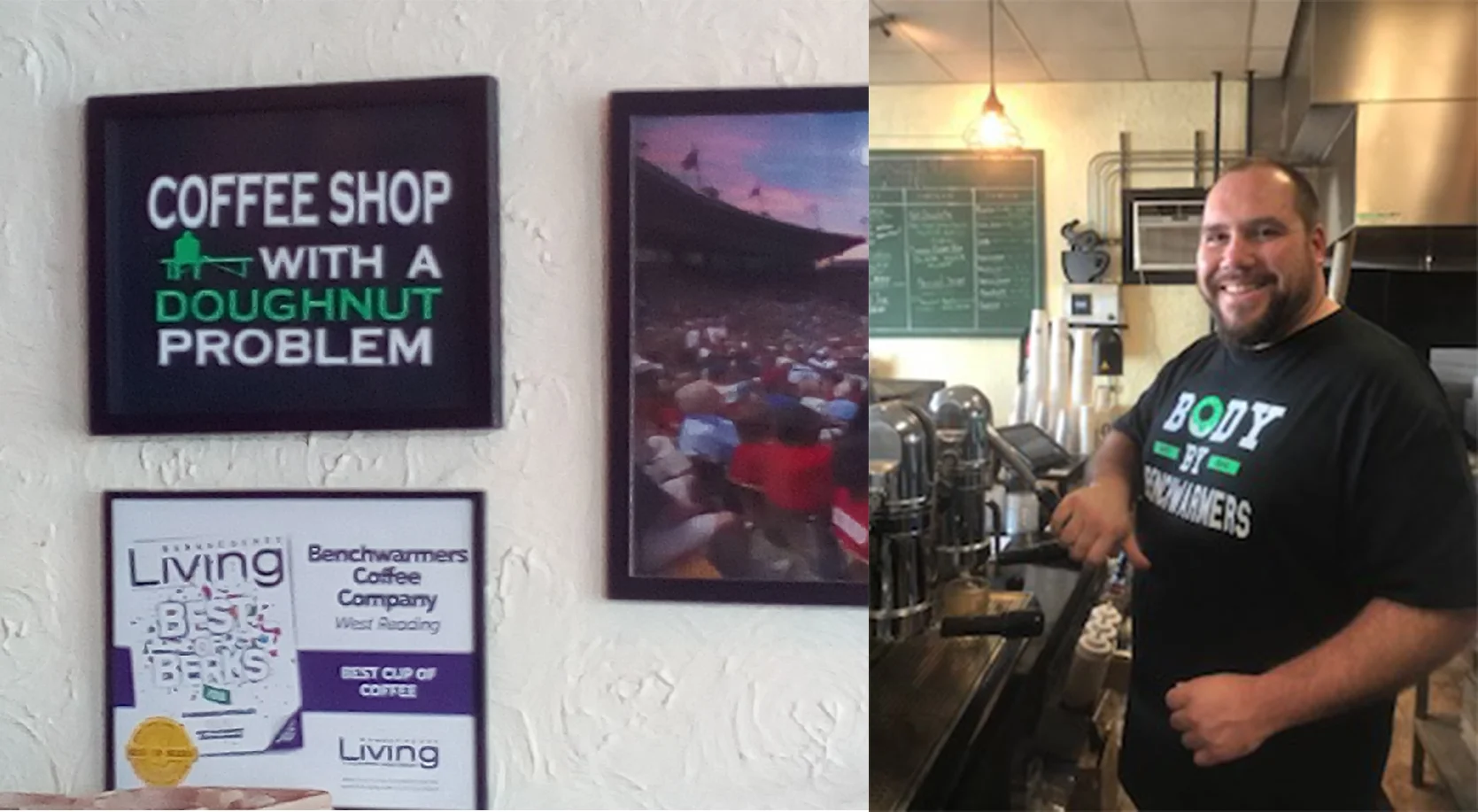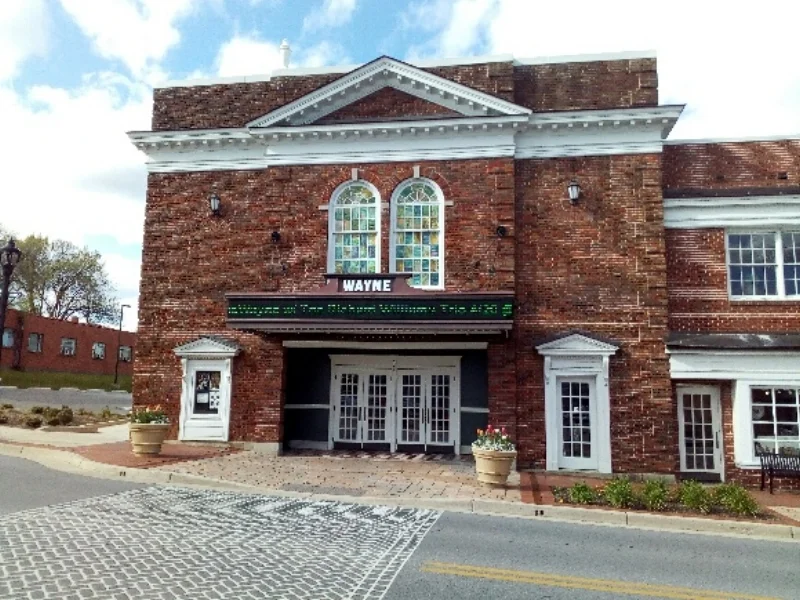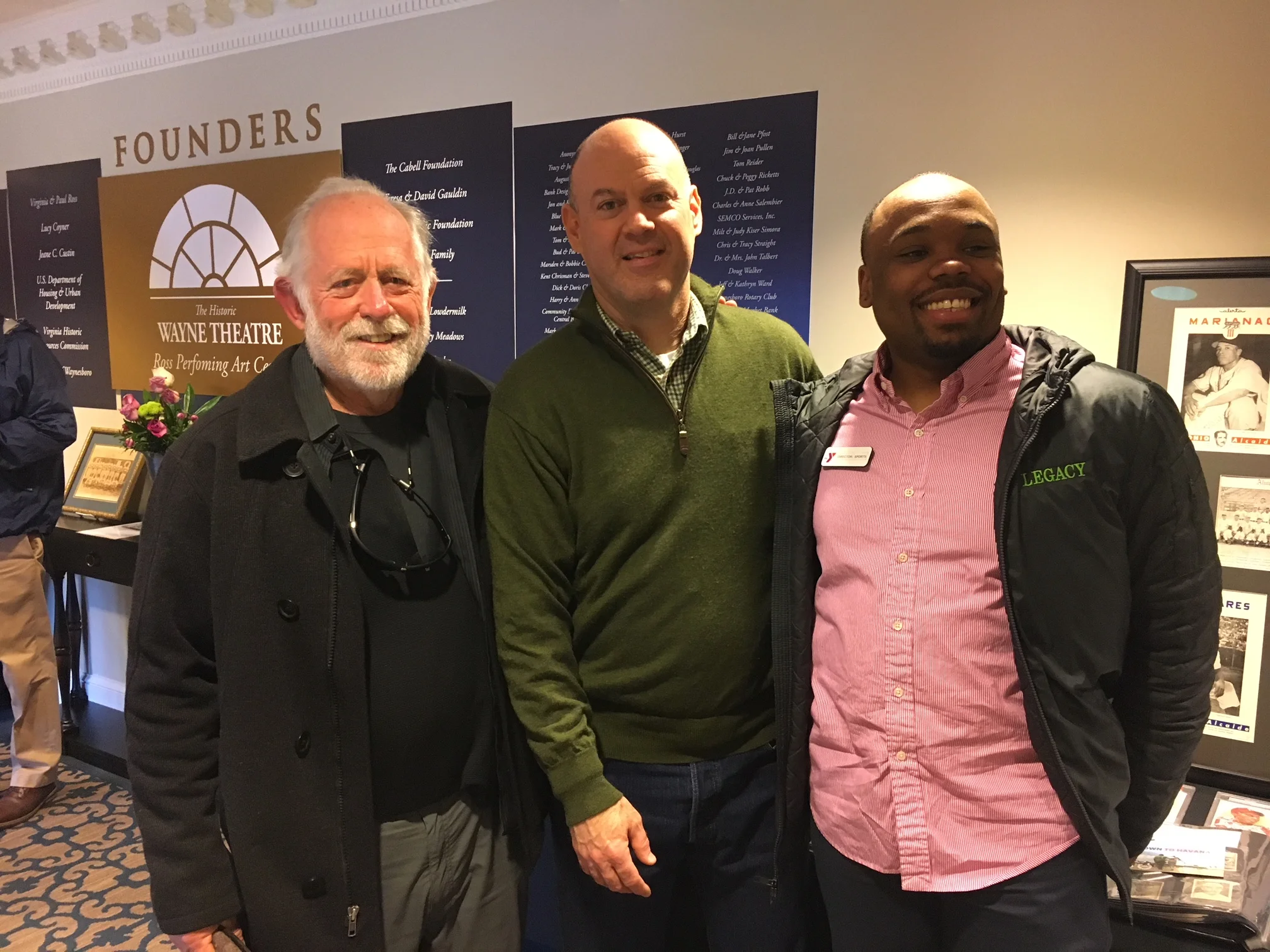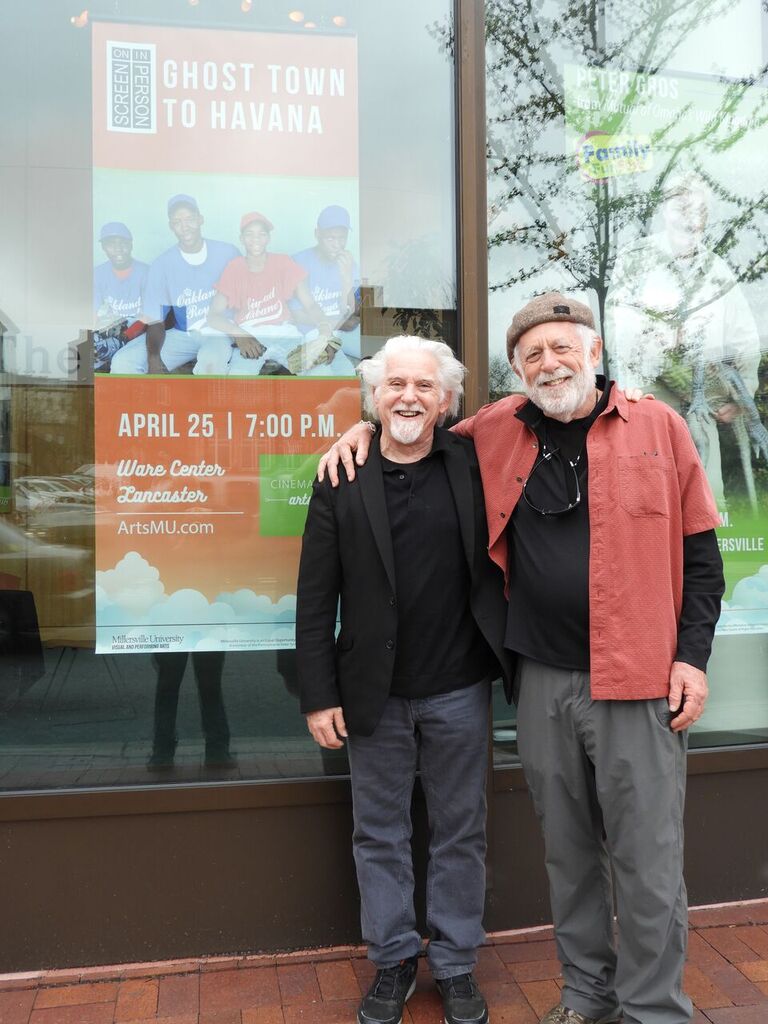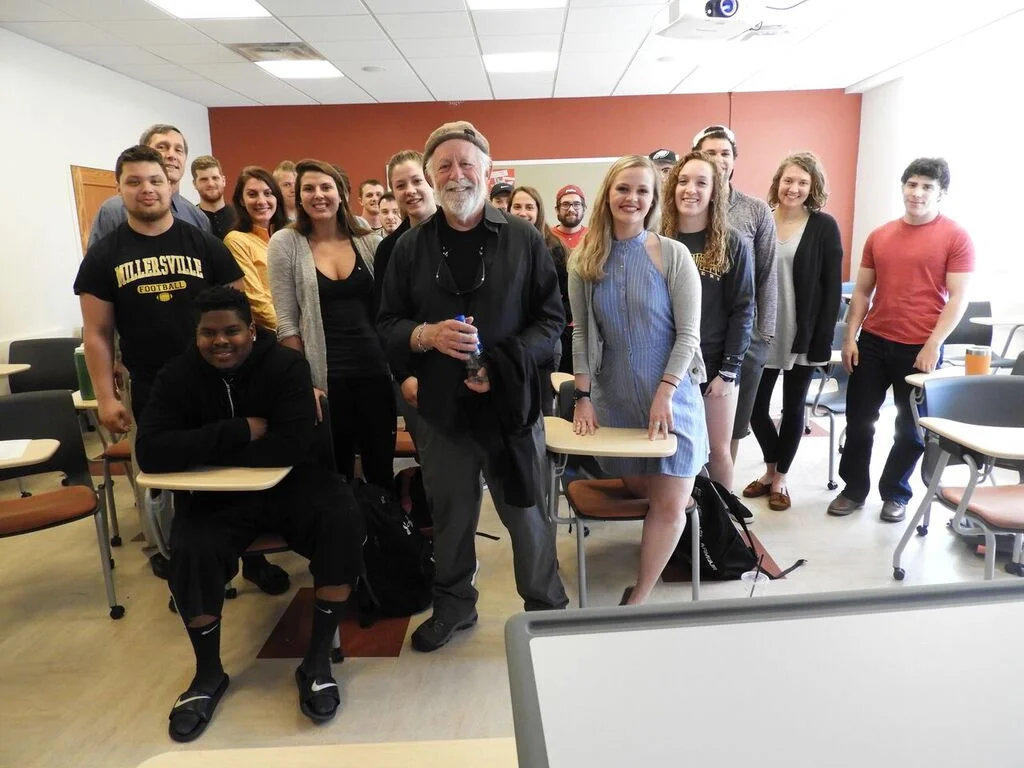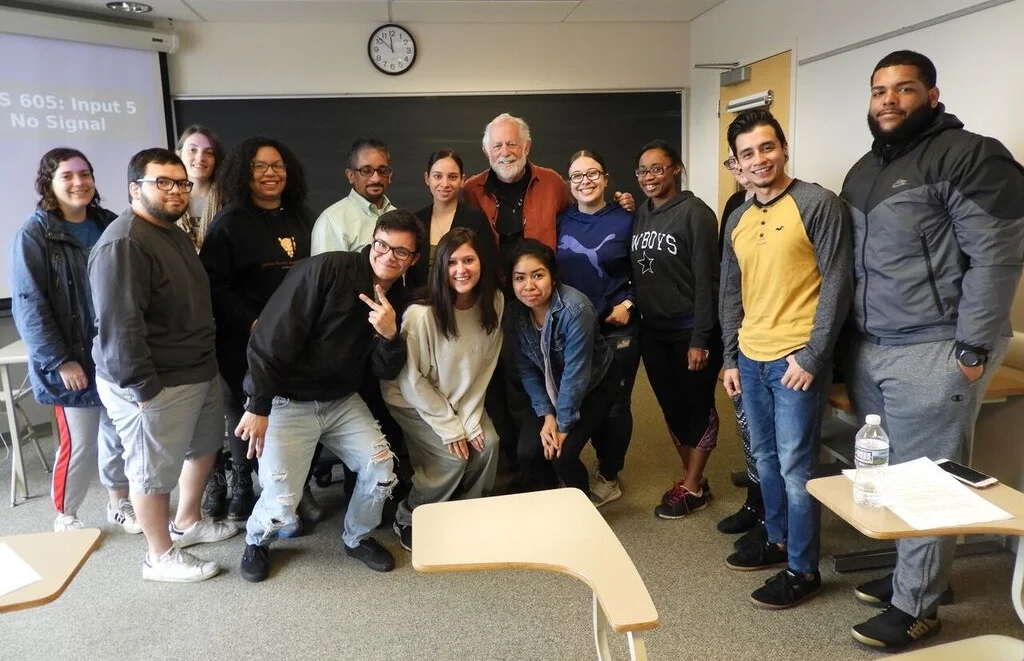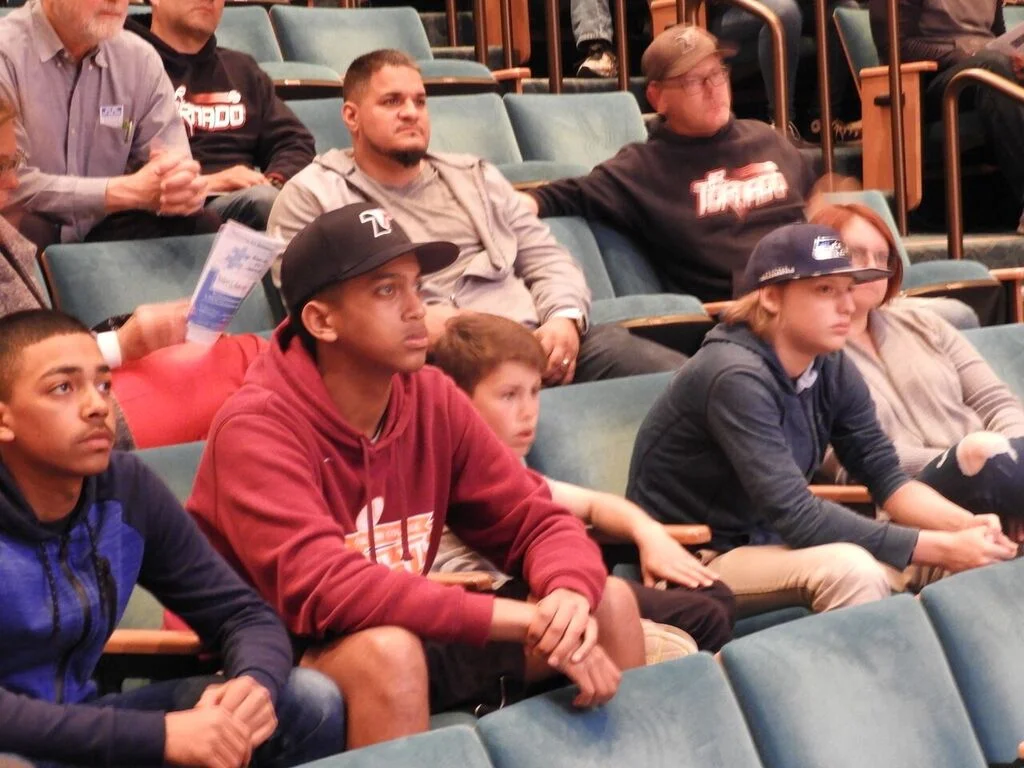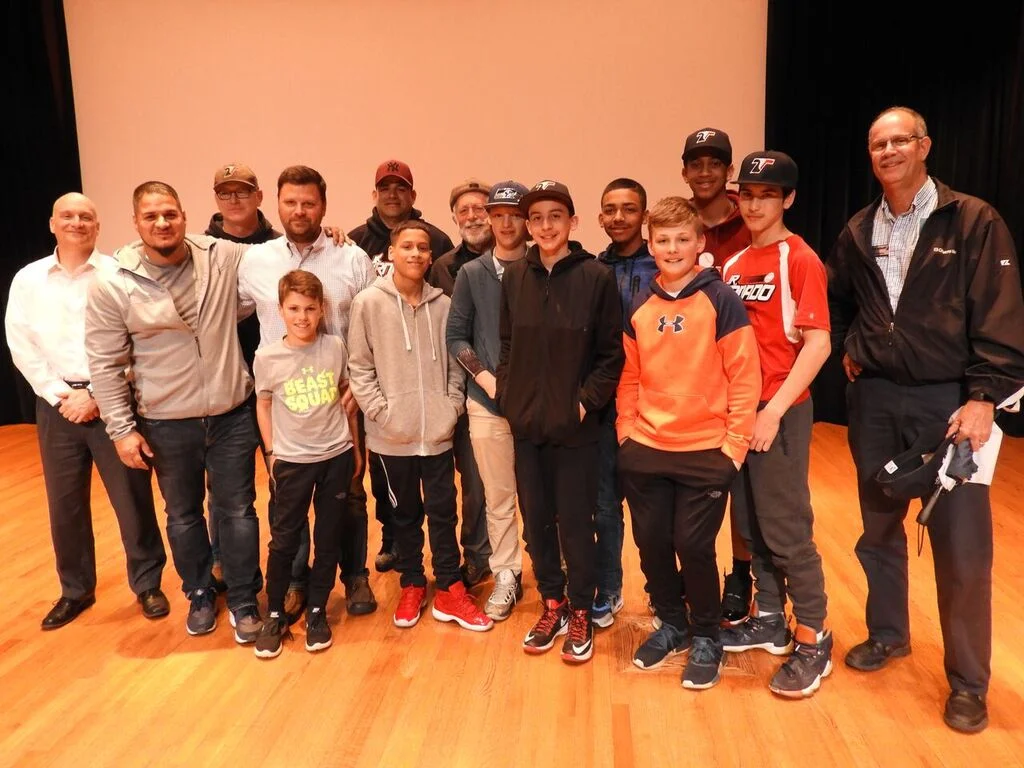April 12, 2018 Screening - Reading Area Community College, Reading, PA
Driving to Reading PA, the third of nine stops on Ghost Town to Havana’s Mid Atlantic Arts Tour, I’m starting to get a little worried. What kind of place is Reading, PA and will there be an audience for the film there? Bloomsburg, the lovely small college town and Blue Bell, PA, the wealthy Pennsylvania suburban enclave aren’t communities I would expect to find an audience for Ghost Town to Havana, an urban film set in two majority black communities, one in Oakland, California, the other in Centro Habana, Cuba. I’m frankly hoping Reading is urban but the drive west through Pennsylvania woods interspersed with rolling green hills, does not fill me with optimism. I’ve been in touch via email with Cathleen Stephen, Director of the Miller Center for the Arts in Reading - where the film will screen - and Natalie Babb, Outreach Coordinator; the emails have been encouraging. Cathleen and Natalie have reached out to Baseballtown Charities, a charitable foundation setup by Reading’s minor league team, the Reading Fighting Phils, a farm team for the Philadelphia Phillies. Baseballtown Charities is active in the community, offering opportunities for low income and handicapped youth to participate in organized sports. Baseballtown Charities is partnering with the Miller Center for the Arts to sponsor the screening.
After two mornings of corporate chain hotel buffet breakfasts at the Hyatt House Hotel outside Blue Bell, I wake up at the Candlewood Inn and Suites in Reading, another perfectly decent corporate chain hotel. I venture out in the morning in hopes of finding a real place, a local joint, for coffee. I hit pay dirt just a few blocks away: Benchwarmer’s Coffee and Doughtnuts. (https://www.benchwarmerscoffee.com/). The owner, Adam Kenderdine is funny, friendly, with a great sense of humor. A Reading native, he loves his city, is a font local knowledge, and about as far from corporate as you can get, a big relief.
Benchwarmer’s Coffee and Doughtnuts owner, Adam Kenderdine
For future filmmakers on the Mid Atlantic Tour: places like Benchwarmer’s will be your local small business oases in the midst of the deadening sameness of corporate chain store/hotel/fast food/starbucked landscape that America has become. This is the landscape you will be traveling through on the Mid Atlantic Tour. Look for the quirky small businesses and you will find renewal, good company, and good conversation. If you’re lucky enough to find Benchwarmer’s, you'll find great coffee & doughnuts, too. What more do you need? The Mid Atlantic Tour turned me into a rabid fan of American small business. Guys like Adam and places like Benchwarmer’s were my life savers. Regarding lodging, I recommend future filmmakers try Airbnb.
Adam’s walls are filled with pics, mostly of Reading people, places, and teams. A lot of history in this doughnut shop; Reading, I can see, was once a booming industrial city. When I look closer at a pic of fans yelling at a ball game, I notice the ball team they're cheering for is the Reading Fightin’ Phils, whose General Manager and Co-Director of Baseballtown Charities, Scott Hunsicker, will be speaking on the panel tonight. I leave Benchwarmer's coffee with a good feeling about tonight’s screening.
Scott Hunsicker, general manager of Reading Phillies (photo by Ryan McFadden via the Reading Eagle)
The Miller Center for the Arts, where the film will screen, is a lovely theater just across the historic Schuylkill River from Benchwarmer’s Doughnuts and my hotel. Millions of tons of coal came down the Schuylkill; Reading was once a booming, iconic industrial city that has hit hard times. I see a lot of places like this on the Tour; the two primary US locations in Ghost Town to Havana - Oakland and Richmond - were once booming industrial cities themselves. Like Reading, their downward spiral began with the deindustrialization of the 1970s,. Reading feels comfortable and familiar to me.
As baseball coaches and young ballplayers start streaming into the lobby of the Miller Center, it becomes very clear that Cathleen Stephens, Director of the Miller Center for the Arts, and Natalie Babb, Outreach Coordinator, have done an excellent job of community outreach. The Reading youth baseball community is here. There’s a nice buffet and reception, volunteers from the community are helping, the kids are gathering around the buffet table, wolfing chicken tenders, there is a a lovely community feel to it. One Reading team, from an outlying area, is made up mostly white kids, while an inner city Reading team has mostly Latino and black kids. It’s explained to me that Reading, with the highest per capita poverty rate in the country, is like a doughnut, with a prosperous and white outer circle and an impoverished center.
The screening is well-attended. The audience loves the film. It connects directly and powerfully with their personal lives. Even the younger kids stick it out. The panel Cathleen and Natalie have put together is top notch.
Coach Leo Martinez and Boys & Girls Club team
The panel includes Leo Martinez, from Puerto Rico, Community Outreach Coordinator for Reading’s Olivet Boy’s & Girl’s Club, Olivet Boys & Girls Club RBI League Coordinator and Scott Hunsicker, General Manager of the Reading Fightin Phils minor league team, youth baseball coach and Vice President and Director of Baseballtown Charities. Tall and athletic and in his forties, Scott is effusive in his praise of the film which directly relates to the work he is doing at Baseballtown Charities. Their mission statement: “Baseballtown Charities is dedicated to enabling Reading and Berks county children to continue to play ball, regardless of the financial situation in their area.”
It became clear that Scott and Leo, living and coaching in very different parts of Reading, from very different backgrounds, were friends and colleagues. Despite differences in race, class, and income, they work closely together. This says something about both men and also something about Reading. The challenges facing the city inspire a loyalty in men like Leo and Scott to the city and each other. Leo doesn’t hesitate to call Scott Hunsicker when he needs funding for baseball gear or league fees. The community feeling between them, the feeling that we’re in this together as a community, is exactly what our country needs right now.
Both men have a deep on-the-ground understanding of the impact of income inequality on organized youth sports in low income cities like Reading across the country. The Amercan “Pay to Play” model of organized youth sports privileges participation of children and youth whose parents can pay and have time to volunteer. In this model, poor black, brown, and white youth simply do not play, unless they are exceptional athletes. The fact that we offer poor and minority youth so few opportunities to participate in youth sports, arts, and music programs, under the guidance of a caring mentor, leaves kids vulnerable to other forms of self-assertion and expression: gangs rather than teams.
Scott and Leo know this. They are both outspoken. Ghost Town to Havana follows the life of a low income inner city coach, Roscoe Bryant, showing how hard it is to hold down two jobs and also volunteer coach while also raising money to pay for gear and uniform for his kids and league fees. Leo doesn’t care how hard it is, his was a take-no-prisoners attitude. The problem isn’t that it’s hard, of course it’s hard: the problem is that men in the community have forgotten how to be men. I don’t agree with Leo but this is what an exchange of ideas is all about. I reminded that Ghost Town to Havana is a great discussion film because it elicits intense reactions and discussions.
Reading was a great screening followed by an intense, often unfiltered and illuminating Q & A, with an engaged audience and panel for whom the issues of the film were not remote and philosophical but directly related to their lives.
The next morning I am scheduled by Natalie Babb to have lunch with a Latino group from Reading Area Community College called CONEXIONES, a professional development and support group at Reading Area Community College.We meet at a local eating place, “Mi Casa, Su Casa” that serves "Latin and American comfort food."I love the place, about as non-corporate as you can get.Another local Reading restaurant with friendly servers and a welcoming atmosphere.I ate the previous night at The Peanut Bar, an “iconic downtown Reading Bar and Restaurant.”I realize I haven’t eaten corporate since I arrived in Reading, a wonderful break from chain restaurant food and the anonymous chain restaurant vibe.CONEXIONES turns out to be a great group.There are 8-10 members at lunch, a lively bunch active in the community in myriad ways and also focused on incorporating Latin American studies into curriculum at RACC.This community impresses me.I leave Reading on a high.
Filmmaker Eugene Corr with Reading players and coaches
April 17, 2018 Screening - Atlas Performing Arts Center, Washington DC
From my journal - "Roscoe and Althea flew into Baltimore last night, are driving down to DC this morning." ("Roscoe" is Coach Roscoe Bryant, the main character in Ghost Town to Havana. Althea is his bride of one year. They've flown from Oakland CA on their own dime to attend the DC screening, visit the Washington Nationals Youth Academy, and, they hope, to meet Congresswoman Barbara Lee. Journal: "We meet Tommy Goodman, Exec Director of CEBF ("Caribbean Educational and Baseball Foundation") for lunch a few blocks from the Washington Nationals ball field. Tommy/CEBF are sponsoring the DC screening and have generously paid for Coach Bryant's DC hotel room. Easy and fun talking with Tommy - about baseball, Cuba, CEBF's work there, inner city baseball, etc. We talk about possible topics for the panel discussion after the screening tonight. After lunch, we pile into Roscoe's rental, drive across a river ("is that the Potomac?" asks Roscoe. It is. Something magical about crossing the Potomac) to the Nationals Youth Academy a few miles away to meet with Charlie Sperduto, who runs the baseball program there."
Eugene and Roscoe with Baseball Operations Manager Charlie Sperduto at the Washington Nationals Youth Baseball Academy, Washington D.C.
Charlie gives us the tour of the Youth Academy facility. I've rarely seen Coach Roscoe at a loss for words. He’s blown away. The facility - 3 ball fields, classrooms, a kitchen, a library - is staffed and run by dedicated and gifted teachers, coaches, trainers: all there free of charge for low income, mostly black, Washington D.C. kids. For Roscoe, seeing this is seeing a longtime dream come true. What he has dreamed of doing one day in Oakland has come to full, beautiful reality...in DC. Charlie shows us the gardens where kids learn to grow their own vegetables and the kitchen, where they learn to cook what they've grown: that's Althea's dream, to teach health and nutrition to low income kids addicted to cheap sugar drinks and junk food, and now it’s her turn to be blown away. She’s already managed to pull off a nutritional miracle: getting Roscoe to give up Macdonald's junk food. When Roscoe sees the classroom with the windows looking out on one of the three beautiful ballfields, I see his eyes fill with wonder and emotion. Education is the crucial centerpiece of the program at the Washington Nationals Youth Academy and central to Coach Bryant’s vision. Here's the link to the Academy website (http://washington.nationals.mlb.com/was/youth-baseball-academy/). It shows what a program can be. Meeting Charlie and the WNYA staff has been an inspiration for the Coach. He leaves knowing that this is the program that he would like to replicate for inner city Oakland kids someday. Althea says what a difference it would make if every city had a program like this.
If you’re reading this and thinking, "Wow, isn’t Major League Baseball wonderful, doing all this for impoverished inner city kids," let me put this amazing program in Washington DC in context for you: there are 8 Major League teams with urban youth academy programs for inner city and disadvantaged youth. There are 32 Major League clubs, ie. 24 of them don’t have Urban Youth Academies. Every club should have one. All 32 MLB teams have Academies in Caribbean countries and Puerto Rico. Why not here? This blog is not the place to get into the baseball and financial weeds of that question; but, foregoing the weeds and just looking at it morally, we'd end up with the same conclusion: every Major League Club should have an Urban Baseball Academy in their home city.
RBI (Restoring Baseball in our Inner Cities), is another MLB program that has the potential to make a major impact but sufferers from severe underfunding. MLB does a far better job at promoting and publicizing it's modest efforts in poor communities than it does in creating, funding, and running these programs. A handful of Major League clubs run impactful independent programs such as the exceptional Junior Giants free youth baseball program that gives 25,000 low income kids in California a chance to play organized youth baseball. These programs can and should be replicated in every Major League city in the country.
But they aren't.
It's dramatic and just that Major League Baseball honors Jackie Robinson each year by having every Major League player wear his number 42 on the day Jackie broke baseball's color line - April 15, 1947. All players wearing number 42 has historic and educational value but in the end it’s a self-congratulatory MLB gesture that does nothing to address the problem: the “pay to play” exclusion of black youth from low income families from participation in organized youth baseball. If Jackie Robinson were alive today he would demand Major League Baseball do more than make symbolic gestures. Give black kids today the opportunity to cross the color line of organized youth baseball the way that Jackie Robinson crossed the color line in Major League Baseball in 1947.
I made Ghost Town to Havana primarily to make the American public aware that our country's "Pay to Play" model of youth sports is excluding poor youth from participation in organized youth sports. So far, the film has failed to make much of a dent in public awareness of the issue. I'm on the Tour to try different approaches to publicizing and promoting the film.
Youth Academy hallway is lined with photos & paintings of African American baseball heroes of the past. Here filmmaker Eugene Corr and Coach Roscoe Bryant are in front of the great Josh Gibson.
Roscoe, Althea, and I arrive at The Atlas Performing Arts Center for Arts around 6:30 pm. Usually I arrive earlier for the tech check but because of the visit to the Washington Nationals Youth Academy, we’re running late. This is perhaps our most important screening of the Tour, certainly the most high profile. It’s a great honor that Congresswoman Barbara Lee - Oakland, California’s beloved and respected representative in Congress - has agreed to introduce the film; Congresswoman Lee’s appearance is one of the reasons Coach Bryant flew across the country for the DC screening. No member of Congress has visited Cuba as often at Congresswoman Lee, nor worked as tirelessly for the establishment of diplomatic relations between the US. and Cuba than Congresswoman Lee. She has also championed the cause of low income inner city residents - especially in her district in Oakland California where most of Ghost Town to Havana takes place. Congresswoman Lee supported the film early on, even writing to the Office of Foreign Assets Control in the US Treasury Department, advocating that OFAC approve our application for a license for Coach Bryant's team to travel to Cuba to play a Centro Habana team. We can't think of anyone more perfect to introduce the film than Barbara Lee..
Doug Yeuell, Executive Director of the Atlas, has put together a superstar panel for after the screening: First Secretary Miguel Fraga of the Cuban Embassy, Emily Mendrala, Executive Director of the Center for Democracy in the Americas, Tommy Goodman (Caribbean Educational and Baseball Foundation). Coach Roscoe Bryant, an inspirational speaker, and myself round out the panel. We feel honored to be among such fine company. It seems right that in our nation’s capitol, the focus of the panel discussion will be on Cuba/American relations more than “Pay to Play” issue that dominates the after screening conversation in most other cities
After 46 years in film and countless screenings, I am rarely nervous before a screening. But I am before this one, which surprises me. I head immediately to the theater to do the tech check. If the film looks OK, I’ll be OK. But the film, which has looked beautiful in previous Mid Atlantic screenings, doesn’t look good at all. It’s low res, muddy, faces in wide shot are featureless. I say, “This looks like the dvd. You don’t have the BluRay?” The projectionist, a young woman, says: “It is the dvd, we don’t have a BluRay.” I remember now, The Atlas was the only venue that requested a dvd rather than a BluRay.“ Projectionist: “We have a BluRay player now though.” I feel a surge of relief, pull two BluRays out of my backpack, hand them over, and begin to calm down. I’m calm for about 60 seconds. The projectionist can’t get the BluRay image to play; we can hear the movie but can’t see it. We try another BluRay. Same result. It’s now close to the 7 pm start time. Someone on the Atlas staff tells me that Congresswoman Lee has arrived. The projectionist by this time has tried everything she can think of but can’t get picture to play. I say, “Ok, let’s go back to the dvd. It doesn’t look great but at least we know it plays ok.” We put the dvd back in. Now it won’t play. Same problem: sound but no image. I realize the projectionist is doing the best she can, and that I’m not helping by hovering over her and worrying. I hope for the best, leave to greet Barbara Lee and arriving guests. Like computers crashing only when you’re on a big deadline, projection problems happen only at the most important screenings.
Barbara Lee is gracious, makes a beautiful introductory speech, in the course of it she mentions that she first heard of the film, Coach Bryant, and the Oakland Royals from her good friend, Ralph Grant. I see Roscoe’s jaw drop. We exchange a look. Ralph Grant, a tall, elegant black man, was Coach Roscoe’s mentor, a man he deeply admired and still tries to emulate. Mr. Youth Baseball in Oakland, Ralph is one of four remarkable men, now deceased, that we dedicate the film to.
Doug Yuell, Eugene Corr, Congresswoman Barbara Lee and Roscoe Bryant with his wife Althea Bryant.
Roscoe and I are grateful to Congresswoman Lee for the letter she wrote to the Office of Foreign Assets Control in the US Treasury Department in the early days of the film supporting the Oakland Royals youth baseball team’s trip to Cuba. Half of Ghost Town to Havana is about this trip; a trip that might not have happened without Congresswoman Barbara Lee’s early support. What Coach Roscoe and I didn’t know until hearing Congresswoman Lee speak, is the crucial part Coach Ralph had played by talking up the film, the Oakland Royals, and the Cuba trip to his friend, Barbara Lee. It’s a very emotional moment for Roscoe and for me. Every film is a journey and Congresswoman Lee’s speech completed, for want of better words, a spiritual circle for both us. The film is about the importance of mentorship in the lives of youth and the health of a community. Here it was, in Congresswoman Lee’s words, made manifest once again.
The projectionist has gotten the dvd player working; there is both picture and sound but image quality is still poor. Coach can see I’m not happy, tells me it’s gonna be OK the way coaches do. One of the things you learn playing baseball or making films or trying to do anything really, is that if you keep thinking about an error you made, you’ll make another, even bigger error. It’s an unforgiving rule of baseball, life, and filmmaking. I know this rule well, and it’s still hard for me to shake it off and forget it when something goes wrong.
Despite my concerns, the audience loves the film. The panel that follows is amazing. Everyone is excellent; First Secretary Miguel Fraga and Coach Bryant are the stars. Miguel speaks eloquently and humorously of his desire for better relations between Cuba and the United States. Coach Bryant is inspiration. The audience is wonderful. There are a dozen people in the audience who could be on the panel themselves: Jake Wald of Positive Coaching Alliance/DC Chapter, Charlie Sperduto, Chris Henderson, and Kerrick Craig of the Washington Nationals Youth Academy, Mark Hyman (Professor, George Washington University), author of many articles and several books about youth sports, including “The Most Expensive Game in Town),” and Damion Thomas, Curator of Sports at the African American Museum of Culture and History. It was distinguished audience, nearly filling the small black box theater at the Atlas.
A potentially significant outcome of the DC screening: Cuban First Secretary Miguel Fraga offers his enthusiastic support for our proposal to the Cuban government for a Ghost Town to Havana Tour of six Cuban cities in the Spring of 2019, starting in Havana and ending in Santiago de Cuba. To get US government approval for the Tour, we will likely have to count again on the support of Congresswoman Barbara Lee. We are in ongoing discussions with Tommy Goodman and the Caribbean Educational and Baseball Foundation about partnering on the Cuba Tour.
L-R Damion Thomas, Curator of Sports, National Museum of African American History and Culture, with Filmmaker Corr, Coach Bryant and wife Althea Bryant.
It’s a very emotional 36 hours for Coach Roscoe in DC. After the screening, Curator Damion Thomas invites Coach Bryant and Althea to the African American Museum. Flying out of Baltimore in the afternoon, Roscoe and Althea have only a few hours the next day. Damion gives Roscoe and Althea a personal tour of the Museum in DC. I tag along. It is an amazing, inspiring, humbling experience. And a great honor to be guided through the amazing museum by one of its curators. Coach Roscoe, Althea, and I are deeply honored. Thank you Damion for the Tour, at turns both harrowing and beautiful.
Washington DC was a great experience.
Wayne Theater, Waynesboro, VA Thursday, April 19
Waynesboro, an historic frontier American town in the 1700s and early 1800s, is today in many ways a typical American town, population about 21,000. Typical in the sense that most of the local stores downtown have been shuttered and closed, the small businesses bankrupted by a combination of closing factories and corporate competition: businesses are clustered out by the interstate on the edge of town, virtually all corporate. These clustered exit lane corporate eruptions feel like fast growing tumors on the declining host town, sucking the life out of the real places. My hotel, recommended by the Wayne Theater staff, is the Holiday Inn Express. You curl off Interstate 64 and there it is, 1500 feet away, across the street from a Comfort Inn and a Days Inn and Outback Steakhouse. It begins to grind on you, the sameness of it. By now, I am regretting I ignored Airbnb.
I think of a Mid Atlantic Tour challenge that will improve the experience of the Tour for all future filmmakers: to do the entire 9 city On Screen/In Person Tour, never sleeping or eating in a major corporate chain hotel or restaurant.
I check-in and head downtown. The Wayne Theater is a lovely old theater downtown, lovingly and beautifully restored. The downtown, with its many shuttered stores, is showing encouraging signs of a come back. You can imagine the lively place it once was when the factories and textile mills were running full bore.
Wayne Theater, Waynesboro Virginia
No time to do any real outreach in Waynesboro but after I call Tracy Straight, Director of the Wayne Theater, and leave a voice mail, I do what I sometimes do when I get into a new town: I call the YMCA and the Boys and Girls Club and tell them about the screening that evening. The Boys and Girls Club operator puts me right through to Annie Sachs, Executive Director of the Waynesboro B&GC. I start to tell her about the screening that evening; Annie interrupts to tell me that Tom Hardiman, Boys & Girls Club board member and active volunteer, already got a call from Tracy Straight and is coming tonight, bringing his collection of Negro League baseball photographs. Thanks to Tracy for reaching out to Tom, who turns out to be a wonderful and engaging addition to the Waynesboro after screening panel. Next I call the YMCA. It’s last minute but I’m put through to Melvin Garrison, Waynesboro YMCA Sports Director, who tells me he hasn’t heard of the screening but will be there tonight.
Tracy Straight invites the panel to a pre-screening dinner. She leads us to the downtown restaurant, a nice local place just a couple blocks down from the Wayne Theater. It’s Tracy, me, Tom Hardiman/Boys and Girls Club and Melvin Garrison/YMCA. Tom, a family man in his forties, brings his wife and daughter. Melvin, in his twenties and new to the Waynesboro job, is bursting with energy and ideas. Tom is white, Melvin is black, both are dedicated to providing opportunities and guidance to low income kids, both love the film, both are practical and idealistic and on fire in the panel discussion after the screening.
I'm delighted to see them, on stage at the Wayne Theater, begin to make plans to work together. This is why I made the film.
Melvin, from a rough neighborhood in DC and Tom, from a poor and struggling town in West Virginia currently at the center of the Opioid epidemic, have a deep understanding of the affect of our “Pay to Play” system of youth sports on poor communities. Tom says that over 600 youth participate in the local Waynesboro soccer league. The Boys and Girls Club serves about the same number of kids in the identical geographical area, yet when Tom compared rosters, only 6 Boys and Girls Club kids were playing soccer. Why? Primarily, the cost to play. Tom says, “The soccer club offered scholarships for lower income youth. That would cover registration fees. Youth would still need to purchase cleats, shin guards, etc. But the club didn’t want to promote scholarships to the Boys & Girls Coub kids for fear that too many would ask for assistance and they couldn’t afford to subsidize that many.”
That, in a nutshell, is what’s going on all across the country.
Filmmaker Corr with panelists Tom Hardiman, Boys and Girls Club & Melvin Garrison, YMCA
The three of us bonded on stage at the Wayne Theater in the Q & A. By the end of the evening, Tom and Melvin were my friends. More importantly, Tom and Melvin, who never met before, were friends. They made plans, on stage and afterwards, to work together for the benefit of the kids. The key to the success of these screenings is for the host site to get key community members involved.
Sunday April 22 Screening - The Queen Theater, Wilmington, DE
The Queen Theater is on North Market Street in historic, slightly rundown, downtown Wilmington. My hotel - “DoubleTree by Hilton Hotel Downtown Wilmington - Legal District,” and isn’t that a mouthful? - is just a few blocks from the Queen Theater. The DoubleTree is a corporate chain hotel, but it is not set down this time in the usual corporate carcinoma on the outskirts of town: downtown Wilmington is a real place with lots of small local businesses, including more black-owned barbershops than I’ve ever seen before in such a small area. I counted 7 barbershops in a 4 block area, each one with the distinct personality of it’s owner. Art barbershops, political barbershops, spiritual barbershops. Small businesses project the personality of their proprietor and give soul, life, and individuality to our cities and towns. Every stop on the Tour makes me more of a fan of American small business. By the time I get to Wilmington, I’ve become so devoted I’m ready to join the Rotarians.
I arrive in Wilmington Saturday April 21, the date of my deceased father’s birthday. It’s a free day. The On Screen/In Person screening is tomorrow (Sunday) at 2 pm. My sometimes difficult relationship with my father, an inner city baseball coach, is part of Ghost Town to Havana. He would have liked this town. Wilmington reminds me of Richmond, California, the small industrial city on the shores of San Francisco Bay that was my off and on home for years. My father was Richmond to the bone and a ball field legend. When I lived with him, which I did sporadically, it was my town too. Throughout World War II over 100,000 workers labored around the clock on the Richmond waterfront, building ships for the war effort.
At the start of the World War II, the entire population of the city was less than 15,000. By the end of the War, it was 150,000. Wilmington, like Richmond CA, has a storied shipbuilding and industrial past. Without really thinking about it, I find myself walking down to the Wilmington waterfront on the Cristina River; I read the historical markers, plates and placards that are everywhere and find out that Wilmington’s heyday and greatest growth spurt was also in wartime. During the Civil War Wilmington became a world leader in shipbuilding and gunpowder production. I find a friendly bar and pass a few hours talking to locals, learning more about Wilmington.
The film screens in the afternoon in a large space with floor to ceiling windows on two sides - light streams in from the windows and onto the screen, washing out the image. We turn the screen 30 degrees, away from the light. That markedly improves the picture but does nothing for the hangover I’m nursing. One filmmakers opinion: films should only be screened at night in this space.
Tina Betz, Executive Director, an elegant, well-spoken black woman, has put together an interesting panel. Audience and staff are diverse and relaxed. Snacks, drinks, and post screening mingling makes for a relaxed atmosphere for the panel and Q & A. The informal way that Tina configures the discussion - mixing the panel and filmmaker with the audience makes for an informal, democratic discussion among equals, breaking down the separation between filmmaker/panel and audience. A remarkable discussion ensues. Panelists Ronaldo Tello (psychologist, community organizer, www.delhispano.com) and Gabriela Watson (filmmaker, teacher) are terrific. Scrawled in my journal: “high point for me was a young black woman who spoke thoughtfully and eloquently about the film - said that it made her reflect on her struggles with her own hard-edged father and about the stereotypes that divide and reduce us. As she spoke about her smart, angry, tough black father, a man wounded by poverty and hardship and who she both loved and struggled with, she could have been describing my own father."
Natty Tello, moderator Ronaldo Tello, panelist/filmmaker Gabriela Watson with Corr
A simple honest moment and it was for me one of the most powerful personal moments of the tour. The barrier between filmmaker and audience, between gender and race was - for a few moments at least - erased by shared human experience and connection. I don’t think this moment would have happened if the panel was at the front of the room facing the audience in the formal and usual teacher/student manner typical of post screening Q & As. Thank you, Tina Betz, for arranging the group discussion in such a way as to make this possible.
A side note: as we broke up after the screening and went our separate ways, I remarked to someone how comfortable I felt in Wilmington. I was told not to feel too comfortable because Wilmington is one of the most dangerous cities in the country. I could see some of the warning signs but still liked Wilmington. Richmond and Oakland are often rated as among the most dangerous cities in the country. For years, Richmond was the "Small City Murder Capital of the United States." It struck me as ironic that one can feel more comfortable in an unsafe but familiar environment - like Wilmington - than in a safe but unfamiliar one - like Germantown.
April 25, 2018 Screening - Millersville University of Pennsylvania, Lancaster PA
Barry Kornhauser, Office of Visual & Performing Arts, is waiting for me in the lobby when I arrive at the Lancaster Hotel. We exchange a friendly hello, I check in, and Barry hurries off to get his car. I leave my luggage at the front desk and run out to the parking lot where Barry waits in his car to take me to my first outreach assignment in Lancaster. Somehow, with Barry, this rushing to and fro is fun, even relaxing, and he will have me jumping for the next 25 hours of my stay in this beautiful city.
Filmmaker Corr with promoter extraordinaire, Barry Kornhauser. Barry fills the Ware Center Theater in Lancaster with “a Noah’s Arc of Humanity” audience for an extraordinary screening of Ghost Town to Havana.
It’s 10:45 am when we pull out of the Lancaster Hotel parking lot; Barry has me scheduled to speak to an 11 AM class at Millersville University of Pennsylvania, about 15 minute drive from Lancaster. Barry and I talk en route and by the time we get to the campus, Barry feels like an old friend. The class is “Latino Issues of Identity,” about which I know next to nothing. I am white, 50 years older than most of the students, and wonder what, if anything, I will be able to contribute to this class.
Not sure of where to start, I begin talking about my friend Roberto Chile, the Cuban Director of Photography and Co-Director of Ghost Town to Havana's Cuba scenes and a gifted visual artist. Called simply "Chile" by friends, his complex Cubano identity, viewed through the eyes of most Americans, would seems wildly contradictory: Chile is a committed Communist, a practicing Catholic, and a believer in the divinity of the African Gods. Almost any American would wonder: how can you be a good Communist, an ideology in which atheism is foundational, and at the same time a Catholic and at the same time believe African Gods are divine? Though incomprehensible to most Americans, in Cuba, this complex, blended identity is not rare or unusual. This gets things going in the class. Many of these young Latino students, from diverse backgrounds and integrating diverse belief systems, are facing complex identity issues themselves; they can understand and relate to Chile's complex but well-integrated identity. The time passes very quickly as the class becomes a far ranging exploration of the fundamental human question of identity: who am I? It’s a wonderful start to my Lancaster visit.
Corr with Wellness & Sport Sciences class
Eugene with Millersville University Humanities class students (Latino Issues of Identity)
Barry has put enormous effort into putting together a "Pre-Screening PANEL." As many screenings as I have been involved in over the years, I can't remember a panel like this one. Barry has invited: a manager of a Lancaster Barnstormers, a minor league team; the Director of Sports Services in the Lancaster Recreation Department; a Lancaster Police Officer, active in the Police Athletic League; an Assistant Professor of Social Work and member of the National Aliance of Social Workers in Sports, an Associate Professor of Wellness and Sports scientist, active in the public health aspect of sport; a youth baseball coach. Each panelist has a distinct point of view and area of expertise.
Barry has sent a link to the film to each of the panel participants. They are required to watch the film as a pre-condition of participation on the panel. I speak after the film but am not on the panel. I wonder: will people show up 45 minutes before the screening time to hear panelists talk about a film they have not seen? I admit, I am dubious. It's been hard enough to get an audience to show up at all for some of these screenings, let alone come early for a panel.
I am soon made to realize I have seriously under-estimated the brilliance of Barry Kornhauser's community outreach. The audience shows up early for the panel; Barry nearly fills the Ware Center in downtown Lancaster - an audience I estimate at around 250. It's by far the largest and most diverse audience of my 9 city Mid Atlantic Tour.
The panelists offer deep and varied view of the joys, challenges, inequalities, successes, and failures of youth sports in America. The audience, a broad spectrum of the Lancaster community, looks like a Noah's Arc of humanity. I learn from Barry that Lancaster has the highest per capita number of refugees of any city in America.
When the panel opens up to questions from the audience, a Pakistani man speaks at length to the panel in heavily-accented English. I have difficulty understanding what he's saying. At the end of a fairly long-winded statement, I can tell he’s making some kind of request, but for what I don't know. The panel looks perplexed, as well. A baseball coach in the audience stands and responds: “I think I understand your question, and sure, we’d be happy to play croquet with your team, but, uh...you understand we’re a baseball team, right?" “No, no, no!” shouts the Pakistani man. “Play Cricket! Cricket!” "Ah, Cricket!" says the American coach, "wonderful!" The baseball coach says his team would be delighted to play cricket but the Pakistani team would have to teach his team how to play the game. In turn, he says he would teach baseball to the Pakistani team. The Pakistani coach is delighted. "Yes! Yes!" The audience applauds and laughs. It's a sweetly hilarious and good-natured moment that somehow captures the spirit of generosity, good-humor and openness in this remarkable community.
Ware center audience
Earlier that afternoon, before the screening, I take a walk around Lancaster, looking at the lovely old colonial era buildings and reading from the many historical plaques and tourist brochures: I learn that Lancaster has a strong tradition of religious diversity and tolerance. It has become a tourist destination, people coming from afar to Lancaster County to see the Amish living their simple 19th century lives, plowing their fields behind horses and traveling rural Lancaster roads in their horse and buggies. The city was an anti-slavery, abolitionist stronghold in the 19th Century. Thaddeus Stephens, Lancaster's famed and fierce Radical Republican representative in Congress, fought hard for the abolition of slavery. When the Union north won the Civil War and the slaves were emancipated, he advocated for the confiscation of slaveholders lands and for the land to be re re-distributed to former slaves. His personal life and his political life seem consistent. He lived with a mulatto woman in Lancaster.
After seeing so many towns and cities on the Mid Atlantic Tour in which community life had been replaced by corporate entities and people in the community turned into units of passive consumption more than free citizens, it was lovely to see in Lancaster that continuities and traditions still exist in American life. The Lancaster tradition of welcoming the stranger, begun in the 18th Century continues into the 21st. I understand more fully now why Lancaster welcomes, per capita, more refugees than any other community in the country.
I claim no deeper knowledge of Lancaster than can be gleaned from tourist brochures, plaques, and Barry Kornhauser, but what I saw at the Ware Center in Lancaster, PA, the evening of April 25, was beautiful. The audience loved the film. Of course, that made me happy. I sold out of every dvd and BluRay I had and could have sold more. That also made me happy. What made me most happy was seeing a community aspiring to tolerance and equality. Imperfect in its aspirations, of course, but sincerely aspiring. Barry made the panel and screening an exciting community event, pulling together a diverse community, connecting youth organizations to each other. Not only did people come early for the panel, they stayed after the film ended for the Q & A, then stayed longer after that, introducing themselves to each other, welcoming new arrivals, posing for pictures, exchanging phone numbers and business cards. The problem for Barry, it turns out, isn't getting the audience to come early; it's getting the audience to leave.
Eugene with players and coaches of Roberto Clemente League
Among those approaching me after the screening is a vivacious, tearful, and smiling Afro Cuban woman I guess to be in her early sixties. Her name is Eulalia ("LALA") Yaneth. Eulalia lived most of her life in Centro Habana, Cuba, before coming to Lancaster. She tells me in lovely Spanish, speaking slowly enough for me to understand, that Nicolas Reyes (the coach in Centro and a main character in Ghost Town to Havana) - is a friend of hers. She and Nicolas lived in the same central Havana neighborhood. She was stunned and thrilled to see her friend in the film and became very emotional, says her dear Lancaster friend, Milzy Carrasco. I am delighted and wonder to myself, what are the odds of this happening? Only in Lancaster. These magical sorts of things seem to happen around Barry Kornhauser events. Barry, a Jew from a tough neighborhood in Newark, has found his true home in Lancaster.
It's April 26, the morning after the Lancaster screening and my last Mid Atlantic Tour day. The fact that I am flying home to the Bay Area from Philadelphia at 3:30 pm doesn't stop Barry Kornhauser from scheduling me to speak to a class at 11 am. It's been said, "there's no rest for the wicked." To that I would add, "there's no rest for the wicked...or for anyone working on outreach with Barry Kornhauser." I have a plane to catch in Philadelphia at 3:50 pm ("allow 2 1/2 hours since you are unfamiliar with the roads") and it's 11:25 am when I say goodbye to to Dr. Gordon Nesbit's Sports Psychology class.
Barry and I hurry to our cars after the class.I follow Barry to the highway the will take me to the Interstate and Philadelphia.He pulls to the side of the road and gestures for me to turn right at the next intersection.I see him waving goodbye in my rear view mirror.Soon I find myself in beautiful rolling countryside, traveling back in time.A horse and buggy comes towards me on the narrow two lane road, carrying a load of red and yellow flowers.I feel as if I'm in a dream.I pass a man plowing a field behind a horse-drawn plow, three young children sitting at his feet, the girls in 18th Century bonnets.I breast a rise in the road and see a simple school house and country ball field so impossibly green I think I must be hallucinating.A boy, 11 or 12 years old, in a straw hat and suspenders and brown pants, throws the ball toward home plate.The boys are all dressed the same way and girls in bonnets and long skirts from another century look on.It looks like a team of Tom Sawyers playing baseball.I've come across a school lunch break ballgame in Amish country.There is something ineffably joyous and innocent in the tableau. It is a perfect last image for my Mid Atlantic Tour.
